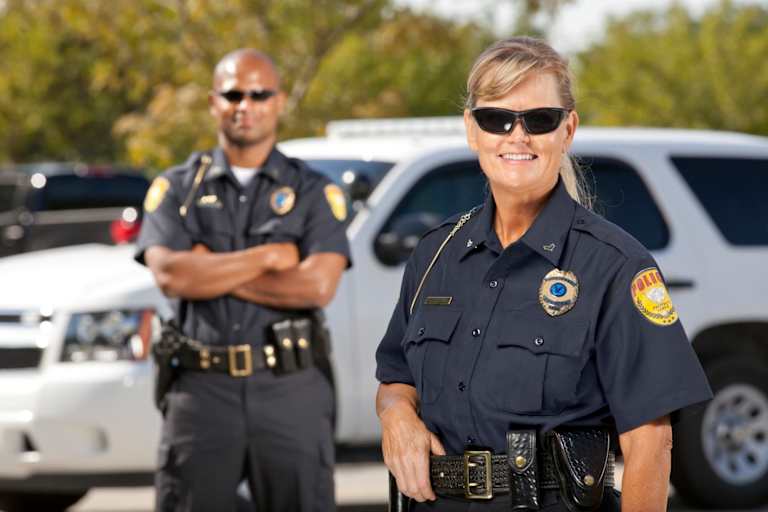Best Online Criminal Justice Bachelor’s Degrees 2026
The academic and professional field of criminal justice extends to the systems and institutions involved in criminal prosecutions and offender rehabilitation. It specifically covers:
- Law enforcement
- Criminal court systems
- Correctional systems
Criminal justice strives to ensure that offenders, crime victims, and communities receive fair treatment. The field also intersects with social justice, advocating for systemic reforms to prevent bias and discrimination in prosecution and sentencing.
An online criminal justice degree can equip you with the technical knowledge and practical skills you need to enter, advance, and thrive in the field. This guide focuses on programs at the bachelor’s level, which support early-career opportunities.
Why Earn Your Criminal Justice Degree Online
- Enjoy a flexible learning schedule while maintaining a full-time job.
- Qualify for careers that allow you to make a difference and give back to your community.
- Save money — many online schools for criminal justice have the same tuition rates for all students, regardless of state residency.
Best Online Criminal Justice Degrees
Florida International University
- Miami, FL
- 4 year
- Campus + Online
- Accredited
Why It's a Top Program
FIU’s online bachelor’s in criminal justice program is part of a robust online catalogue, making it the largest online university on this list. By joining the 25% of its nearly 45,000 undergraduate students taking classes exclusively online, you can find support and resources that help you thrive in a distance learning environment.
What to Expect
- Earn 120 total credits, 60 of which are major-specific.
- Complete a recommended but not required internship.
- Work with a success coach throughout your degree program.
How to Enroll
Submit transcripts from every high school and post-secondary institution you’ve attended, along with a $30 application fee. If you’re a high school student applying as a first-year student, you need to submit your AP, SAT, or ACT scores.
66%
$ 6,168
93%
$18,566
- Acceptance Rate
- 55%
- Students Enrolled
- 54,817
- Institution Type
- Public
Kennesaw State University
- Kennesaw, GA
- 4 year
- Campus + Online
- Accredited
Why It's a Top Program
The online bachelor’s in criminal justice program at KSU offers the most affordable online tuition rate on this list, with residents and nonresidents paying just $190 per credit. You can complete the required courses entirely online, in a hybrid format, or in-person at KSU. Many students also complete an internship during the program, but it isn’t a requirement for graduation.
What to Expect
- Prepare for careers in criminal justice, loss prevention, and law.
- Complete required firsthand research.
- Enroll in dual undergraduate and graduate degree pathways.
How to Enroll
Pay a $40 application fee, and, if accepted, enroll for one of the three yearly start dates. First-year students applying for fall 2026 and beyond are required to submit official ACT or SAT scores. You may be admitted for spring 2026 or summer 2026 without an ACT or SAT score if you have a high school GPA of 3.2 or higher.
69%
$ 5,700
77%
$21,030
- Acceptance Rate
- 69%
- Students Enrolled
- 47,845
- Institution Type
- Public
North Carolina A&T State University
- Greensboro, NC
- 4 year
- Campus + Online
- Accredited
Why It's a Top Program
In NC A&T State University’s online bachelor’s in criminal justice program, students are required to complete an internship with agencies in fields like law enforcement, law, corrections, forensic science, research, social services, and private security during their senior year. This requirement makes NC A&T's program the best for experiential learning on this list.
Additionally, you can choose to add on a certificate in forensic science, which also requires successful completion of an internship.
What to Expect
- Earn 120 credits.
- Maintain a minimum 2.0 in-major GPA.
- Collaborate with peers and industry professionals in extra-curricular opportunities.
How to Enroll
Submit a $60 application fee. Apply through either the NCAT online portal or the Common App. Send high school and post-secondary transcripts. High school students must include extra-curricular activities. Standardized test scores are optional for those with a high school GPA of over 2.8. You must have a score of over 17 on the ACT or 930 on the SAT
62%
$ 3,540
80%
$17,200
- Acceptance Rate
- 46%
- Students Enrolled
- 13,885
- Institution Type
- Public
Trine University
- Angola, IN
- 4 year
- Online
- Accredited
Why It's a Top Program
Trine University’s online bachelor’s in criminal justice program offers three areas of concentration — criminal justice professional, psychology, and Indiana law enforcement — making it the program with the most concentration options. You can also earn graduate credit as you work toward your bachelor’s degree, allowing you to graduate with your bachelor’s and master’s in criminal justice in just four years and save up to $8,645.
What to Expect
- Study asynchronously, with no set class times.
- Complete a capstone course.
- Learn with a required, hands-on internship.
- Start a new term every eight weeks.
How to Enroll
There are no application fees to apply to Trine. You can transfer up to 90 credit hours from your previous college experience and you must submit high school and all post-secondary transcripts.
96%
$9,576
100%
$9,576
- Acceptance Rate
- 22%
- Students Enrolled
- 8,230
- Institution Type
- Private
University of North Texas
- Denton, TX
- 4 year
- Campus + Online
- Accredited
Why It's a Top Program
UNT’s online bachelor’s in criminal justice program offers the best financial aid opportunities to students, including several departmental scholarships. Among the schools on our list, UNT has the highest percentage of full-time, first-time undergrads receiving institutional grant/scholarship aid (69%), as well as the highest average amount of aid awarded ($6,380).
What to Expect
- Take a required capstone course.
- Complete an optional internship.
- Earn 120 credit hours for graduation, generally over four years.
- Experience real-world criminal justice scenarios in courses, such as in jails.
How to Enroll
To apply, you need to pay a $75 application fee. If you’re in the top 10% of your high school graduating class, you’re eligible for automatic admission to any public university in Texas. You’re also guaranteed admission to UNT if you have a high school GPA of 3.0 or higher.
69%
$ 8,673
77%
$20,973
- Acceptance Rate
- 72%
- Students Enrolled
- 46,864
- Institution Type
- Public
Why Accreditation Matters
Accreditation is a formal process in which independent accrediting agencies verify a school’s academic quality against a set of standards. You must attend an accredited institution to qualify for federal financial aid.
Some academic programs and departments may be programmatically accredited, as well.
Though neither the Department of Education nor the Council for Higher Education Accreditation recognizes any specialized criminal justice accreditors, degree programs in this field may pursue endorsement by the Academy of Criminal Justice Sciences (ACJS). Only a handful of criminal justice programs are currently endorsed by the ACJS.
Types of Online Criminal Justice Degrees
An online bachelor’s degree in criminal justice can prepare you to pursue a career in policing, corrections, investigations, or another public safety field. This major may include courses in cybercrime, victimology, and terrorism. You might also participate in an internship focused on your interests, such as juvenile justice or crime prevention.
Schools commonly offer the following bachelor’s degrees with a criminal justice major:
Bachelor of Arts (BA)
- Emphasizes criminal justice’s social, philosophical, and political elements
- May be a good fit if you plan to attend law school or keep your career options open
Bachelor of Business Administration (BBA)
- Teaches criminal justice from an administrative perspective
- Could lead to a management role at a government, nonprofit, or private agency or firm
Bachelor of Science (BS)
- Focuses on law enforcement’s technical, technological, and quantitative side
- Could lead to a career in policing, forensic science, fraud investigation, or security management
Bachelor of Applied Arts and Sciences (BAAS)
- Trains graduates for leadership or managerial roles in the field
- Designed for current law enforcement professionals and students who already hold associate degrees
Find Online Criminal Justice Schools Near You

Best Criminal Justice Schools in California
What can you do with a criminal justice major? Learn about top careers, how much you can earn, and the best criminal justice schools in California.

Best Criminal Justice Schools in Texas
Although the old adage warns us not to mess with Texas, it doesn’t stop criminals from trying—and when they do, graduates from criminal justice schools in Texas are there to hold them accountable. In fact, the Brennan Center for Justice reports that violent crime in major cities like Austin, Dallas, and Houston has been declining. Many …
Is a Degree in Criminal Justice Worth It?
$9,910
Average annual tuition for an online criminal justice degree (2020)
$46,771
Average starting salary for criminal justice and corrections majors (2023)
Average starting salaries for criminal justice majors fall below the overall average for bachelor’s graduates from the class of 2023, as tracked by the National Association of Colleges and Employers (NACE).
However, the degree can still generate a positive return on investment. The NACE-reported average starting salary for criminal justice majors exceeds the average total tuition cost of a four-year bachelor’s degree, as tracked by NCES in 2020.
A criminal justice bachelor’s degree also makes an excellent educational foundation for future in-field studies at the graduate level. According to NACE, graduates of master’s criminal justice programs earned starting salaries that were 33% higher than the $46,771 figure quoted above.
Frequently Asked Questions
Details vary by program, but schools generally open their criminal justice programs to applicants who meet general undergraduate admission requirements. These typically include a high school diploma or GED certificate, a satisfactory academic record, and test scores if they apply.
Related Pages

Best Online Bachelor’s Programs 2026
Online bachelor’s degree programs offer convenient learning opportunities. Discover top online schools and different types of bachelor’s degrees.

Guide to Criminal Justice Jobs and Degree Requirements
Looking for a criminal justice job? Use this guide to learn about average salaries, in-demand roles, and career paths based on degree level.

Criminal Justice Scholarships and Financial Aid Guide
Criminal justice scholarships and financial aid that can help you pay for your degree and graduate with less debt. Find awards with criteria here.